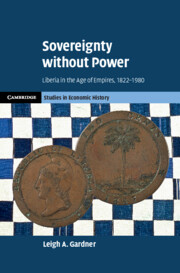‘Liberia has been independent since 1847, yet, sitting too long in the shadow of colonialism, and then becoming too dependent upon stronger states, did Liberia squander its opportunities? In this lucid history, Leigh Gardner skilfully dissects the complex dynamics of Liberia’s development to tell us why sovereignty alone is not enough to secure economic success and political stability.’
David M. Anderson - University of Warwick
‘Gardner tells the story of how Liberia, a small West African country, continued to exercise its sovereignty from Europe during the 18th and 19th century. By placing this story in a comparative perspective, it not only informs us about the unique history of Liberia itself, but it also provides a much broader story about the interlinkages between sovereignty, political power, and economic development in global history.’
Jutta Bolt - Groningen University
‘Gardner’s incisive and original argument uses Liberia to centre the role of power and timing in structuring national economic outcomes. This book is a must-read for anyone interested in the foundations of economic inequality, capitalism and modernity, and the limits of sovereignty in the nineteenth and twentieth centuries.’
Bronwen Everill - University of Cambridge
‘Liberia is an enigma, an African country founded on the promise of economic freedom. Leigh Gardner again shows why she is one of the most intuitive and resourceful economic historians of Africa, tackling the big question of why Liberia has not yet delivered on the promise. In answering this big question, we learn much about migration, infrastructure investment and failed government policies, lessons of relevance to many other developing countries today.’
Johan Fourie - Stellenbosch University





